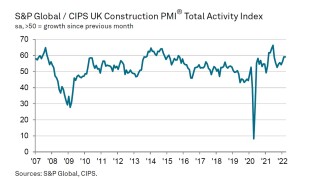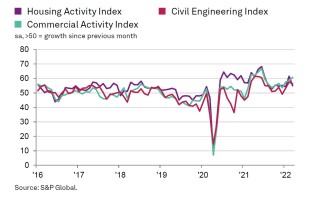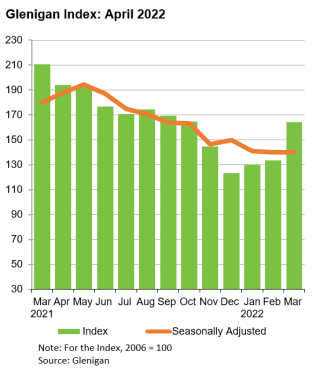The latest monthly survey of purchasing managers suggests a continued rise in UK construction but sentiment declining amid inflation and concerns about the economic impact of the war in Ukraine.
The degree of confidence about the growth outlook was the weakest since October 2020.
The headline purchasing managers’ index (PMI) registered 59.1 in March, unchanged from February and still well above the 50.0 no-change mark.
Commercial work was the best-performing segment in March (index at 60.8), with projects restarting amid the roll-back of pandemic restrictions. This sector has seen output growth accelerate for three months in a row and the latest upturn was the strongest since June
2021. By contrast, recoveries in civil engineering (index at 56.3) and residential work (54.9) lost momentum in March.
Total new orders expanded at a robust and accelerated pace in March, with the latest rise the strongest since August 2021. Construction companies typically cited improving tender opportunities and resilient customer demand, despite some reports that economic uncertainty and rising costs had limited new business growth.
Mirroring the trend for new orders, input buying rose at the steepest pace since July 2021, driven by a combination of stronger demand and efforts to build stocks where possible. Capacity constraints, a lack of haulage and ongoing logistics difficulties mean that 33% of the survey panel reported longer lead times for supplies, while only 1% saw any improvement. However, delays are not as bad as they were last summer.
Imbalanced supply and demand, alongside escalating energy, fuel and commodity prices, resulted in a sharp rise in average cost burdens in March. The overall rate of input price inflation was the highest for six months.
Concerns about the war in Ukraine, forecasts of severe cost inflation and a less favourable global economic outlook all weighed on constructors' confidence in March. Around 48% of the survey panel still expect a rise in business activity during the year ahead, and only 15% predict a decline. But the balance of positive sentiment was the weakest seen since October 2020.
The PMI survey is conducted by S&P Global, following its acquisition of IHS Markit, in collaboration with the Chartered Institute of Procurement & Supply (CIPS).
Tim Moore, economics director at S&P Global, said: "Commercial projects helped keep construction growth at its highest level since last summer as clients boosted spending in response to the roll back of pandemic restrictions. Civil engineering also fared well in March as work on major infrastructure contracts underpinned growth. Residential work found itself in the slow lane, however, as some firms noted that greater caution crept into spending decisions.
"Escalating fuel, energy and commodity prices led to the fastest rise in costs for six months. Intense inflationary pressures appear to have unnerved some construction companies. Business optimism slipped to its lowest since October 2020 on concerns that clients will cut back spending in response to rising prices and heightened economic uncertainty."

CIPS director Duncan Brock said: "A heartening result in March overall where new order levels were the highest since August last year, but not all the sub-sectors offered an equal contribution to output this month. Commercial projects were the most abundant with the strongest rise in almost a year, but residential building became the laggard of the pack as affordability concerns were a factor in holding back progress particularly in new housing and refurbishment work.
"The crippling rise in inflation ramped up again as transport and raw materials went up in price. Longer wait times for deliveries were reported by a third of supply chain managers. Construction companies are braced for more disruption on the horizon as a result of the Ukraine conflict. The rise in purchasing demand fed into higher costs for materials already in short supply as energy hikes also impacted on business costs.
"With these severe challenges, it is no surprise that business optimism for the months ahead has been affected and fell to levels last seen in October 2020. The sector is facing a number of roadblocks as levels of job creation were also held back with the ongoing skills shortage and lack of builders."
The findings of the S&P Global/CIPS UK Construction PMI survey were at odds with other the findings of other industry analysts, however.
Latest figures from Glenigan show the value of underlying construction work on-site falling 7% in the first quarter of 2022 compared with the previous quarter and 22% on the year. (‘Underlying’ here means not counting contracts worth more than £100m because these have an effect of distorting the real picture.)
The Builders Conference recorded £5.77bn worth of new construction contracts signed in March 2022, which a 5% fall on its total for February, despite February having two fewer work days this year.
Commenting on the purchasing managers’ survey, Gareth Belsham, director of the national property consultancy and surveyors Naismiths, said: “The gathering economic storm has yet to fully hit construction. While anxiety about the return of rapid cost inflation has dragged industry confidence down to its lowest level in 17 months, for now construction’s vital signs remain good.
“Demand remains strong, and new orders have now been in positive territory for 22 months in a row. In fact March saw new orders increase at their fastest rate since last August, and builders remain busy across the board – even if housebuilders find themselves in the unfamiliar position of being the slowest growing sector of the industry.
“That said, British builders are braced for a serious shock to their supply chain. At the start of the year Russia and Ukraine together constituted the second largest steel exporter in the world. With imports from Russia now blocked and Ukrainian production all but halted, UK steel prices are surging.
“The availability and cost of other key building materials like timber are also being severely impacted by the war in Ukraine, and a third of the construction firms polled for the PMI survey reported that delivery times for key materials are getting longer too.
“Nearly half of firms still expect business to improve during the course of 2022, but nevertheless both they and their clients are battening down the hatches as a second wave of post-pandemic inflation approaches.”
Got a story? Email news@theconstructionindex.co.uk






